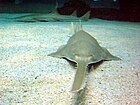Data deficient
| Conservation status |
|---|
| Extinct |
| Threatened |
| Lower Risk |
| Other categories |
| Related topics |
 Comparison of Red List classes above and NatureServe status below  |
A data deficient (DD) species is one which has been categorized by the International Union for Conservation of Nature (IUCN) as offering insufficient information for a proper assessment of conservation status to be made. This does not necessarily indicate that the species has not been extensively studied, but it usually indicates that little or no information is available on the abundance and distribution of the species. It can also indicate uncertainty about the taxonomic classification of an organism; for example, the IUCN classifies the orca as "data deficient" because of the likelihood that two or more types of the whale are separate species.[1]
The IUCN recommends that care be taken to avoid classing species as "data deficient" when the absence of records may indicate dangerously low abundance: "If the range of a taxon is suspected to be relatively circumscribed, if a considerable period of time has elapsed since the last record of the taxon, threatened status may well be justified"[2] (see also precautionary principle).
See also
[edit]- IUCN Red List data deficient species
- List of data deficient amphibians
- IUCN Red List data deficient species (Annelida)
- List of data deficient arthropods
- List of data deficient birds
- IUCN Red List data deficient species (Cnidaria)
- List of data deficient fishes
- List of data deficient insects
- List of data deficient invertebrates
- List of data deficient mammals
- List of data deficient molluscs
- List of data deficient plants
- List of data deficient reptiles
References
[edit]- ^ Reeves, R.; Pitman, R. L.; Ford, J. K. B. (2017). "Orcinus orca". IUCN Red List of Threatened Species. 2017: e.T15421A50368125. doi:10.2305/IUCN.UK.2017-3.RLTS.T15421A50368125.en. Retrieved 19 November 2021.
- ^ "The Categories", in IUCN (1983).
External links
[edit]- IUCN (2001). "2001 Categories & Criteria (version 3.1)". 2014 IUCN Red List. Retrieved 2014-08-26.


